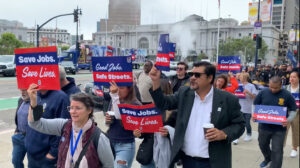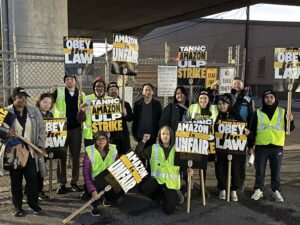Legislature and Governor help Labor to deal with Janus fallout
September 24, 2018The Supreme Court issued its Janus decision, allowing public employees to opt out of paying fair share fees, at 10:00 a.m. Eastern Time June 27. By early afternoon that same day, right wing anti-union organizations were taking action to encourage employees to stop paying fees and some public employers were already encouraging their employees to do so.
Organized labor, however, was already primed to respond. Within about 24 hours of the Court’s release of the Janus decision, Governor Brown signed Senate Bill 866–effective immediately–to prohibit public employers from discouraging or deterring their employees (or applicants) from joining unions or paying fees for collective bargaining representation. This legislation extends to public transportation agencies, which are largely exempt from California public sector labor laws, and it confers jurisdiction on PERB to remedy violations of the law.
This new legislation contains several other provisions that should be helpful in pushing back against Janus proponents. If a public employer wants to send a communication to its employees concerning their right to join (or not join) a union, the employer must first offer to meet and confer with its unions before issuing the communication. The law requires the parties to try and reach agreement on what such a communication should say, but if they cannot reach agreement, the employer is required to circulate the union’s communication on the issue along with its own.
SB 866 also requires employers to honor authorizations from their employees to withhold dues or service fees for their collective bargaining representatives, and if an employee asks an employer to revoke his or her authorization, the employer is required to direct such request to the union representative for that employee. A public employer is prohibited from requiring the union to provide it with a copy of an individual’s authorization, as long as the union certifies that it has and will maintain individual employee authorizations.
An additional provision in the law will make it difficult for anti-union groups to inject themselves into the new employee orientation process. A law passed last year (AB 119) requires public employers to give notice to exclusive bargaining representatives of new employee orientation meetings and to give them the opportunity to attend the orientation meetings and talk to the new employees. SB 866 now provides that the information concerning the time, date, and place of new employee orientations be treated as confidential and shared only with the employees and their exclusive bargaining representative.
These provisions in SB 866 should help limit mischief-making by anti-union ideologues in this post-Janus landscape.





